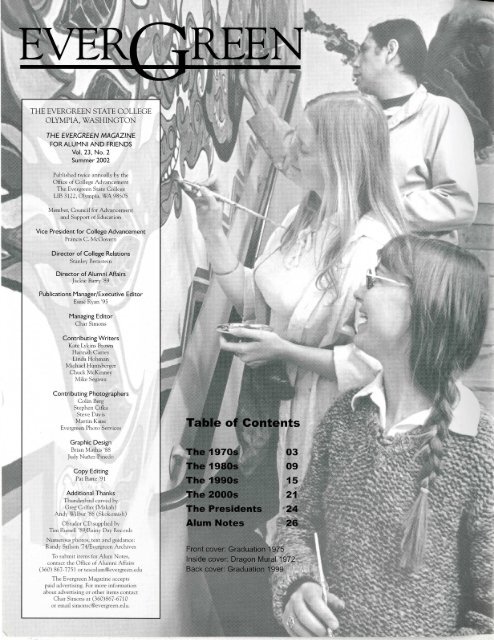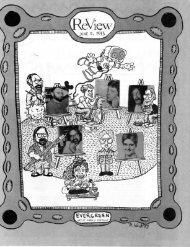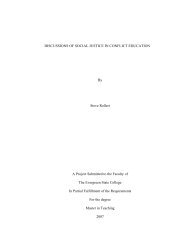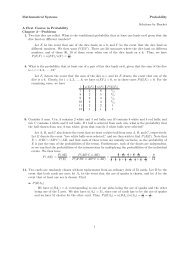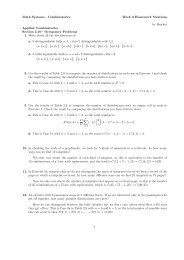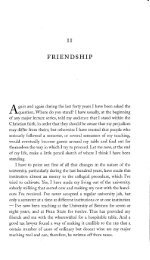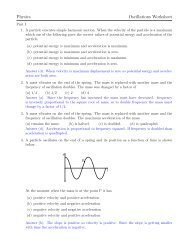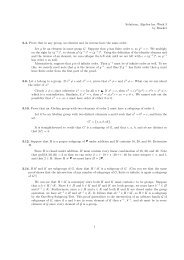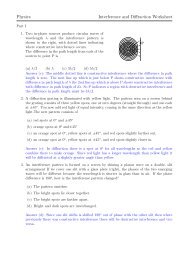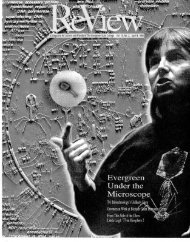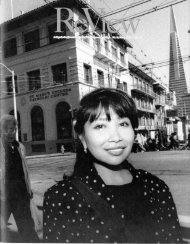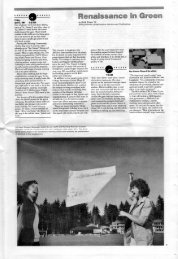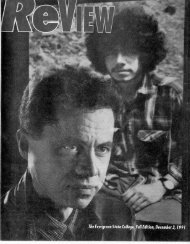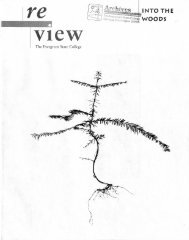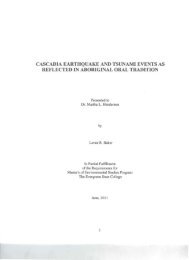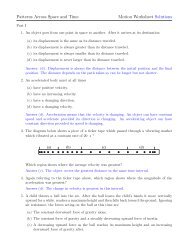V23 #2 Spring 2002 - Archives - The Evergreen State College
V23 #2 Spring 2002 - Archives - The Evergreen State College
V23 #2 Spring 2002 - Archives - The Evergreen State College
You also want an ePaper? Increase the reach of your titles
YUMPU automatically turns print PDFs into web optimized ePapers that Google loves.
THE EVERGREEN STATE COLLEGE<br />
OLYMP1A, WASHINGTON<br />
THE EVERGREEN MAGAZINE<br />
FORALUMNI AND FRIENDS<br />
Vol. 23, No. 2<br />
Summer <strong>2002</strong><br />
Vice President for <strong>College</strong> Advancement<br />
Francis C, McGovern<br />
Director of <strong>College</strong> Relations<br />
Stanley Bernstein ;<br />
Director of A!umni Affairs<br />
Jackie Barry '89<br />
Publications Manager/ Executive Editor<br />
Esme Ran '95<br />
Managing Editor<br />
Char Simons<br />
Contributing Writers<br />
Kate Lykins Brown<br />
Hannah Currey<br />
Linda Hohman<br />
Michael Huntsbcrger<br />
Chuck McKinney<br />
Mike Segawa<br />
Contributing Photographers<br />
Colin Berg<br />
Stephen Cifka<br />
Steve Davis<br />
Martin Kane<br />
<strong>Evergreen</strong> Photo Services • -<br />
Graphic Design<br />
Brian Mathis '88<br />
Judy Nunez-Pinedo<br />
Copy Editing<br />
PatBarte'91<br />
Additional Thanks<br />
ThunderbirJ carved by<br />
Greg Colfax (Makah)<br />
Andy Wilbur '88 (Skokomish)<br />
Obrador CD supplied by<br />
Tim Russell '89/Ramy Day Records<br />
Numerous photos, text and guidance:<br />
Randy Stilson '74/<strong>Evergreen</strong> <strong>Archives</strong><br />
To submit items for Alum Notes,<br />
contact the Office of Alumni Affairs<br />
(360) 867-7751 ortescalum@evergreen.edu<br />
<strong>The</strong> <strong>Evergreen</strong> Magazine accepts<br />
paid advertising. For more information<br />
about advertising or other items contact<br />
Char Simons at (360)867-6710<br />
or email simonsc@evergreen.edu.<br />
rits<br />
t| ("If ; ijjylls<br />
RUDY MARTIN<br />
TEACHING GUI<br />
During the last of three group contracts in<br />
African-American Literature I offered between<br />
1997 and 2000 as part of my post-retirement<br />
activities, it occurred to me that I had gone<br />
through a complete cycle here: I was teaching<br />
the children of former <strong>Evergreen</strong><br />
students. Not just figuratively, but<br />
literally. Wow! Maybe I'm slow,<br />
but I thought I had made a<br />
powerful realization. Perhaps<br />
other faculty members and<br />
students were less struck by the<br />
same insight than I was.<br />
Regardless of the variations in<br />
particular people's recognitions,<br />
however, they all funnel back to<br />
those first groups of students who<br />
joined us here in the earliest years<br />
of the college's life. I think of them<br />
as "pioneer" students—pioneer<br />
students meeting up with similarly<br />
pioneering faculty and staff.<br />
<strong>The</strong> students were everything<br />
from everywhere, and I knew<br />
a lot of them. <strong>The</strong>re were black<br />
students from Seattle and Tacoma,<br />
Native Americans from reservations<br />
and cities, Chicanos from<br />
the Yakima valley, Jews from both<br />
coasts, Asians from the islands<br />
as well as the mainland, pink kids<br />
from Bellevue and California.<br />
<strong>The</strong>re was a grandmother from<br />
Centralia, shot-up Vietnam<br />
veterans from different places,<br />
some of Olympia's "old-growth"<br />
hippies (to quote Paul Sparks),<br />
military brats who had lived photo: Stephen<br />
everywhere, timid mama's babies<br />
leaving home for the first time. <strong>The</strong>y came with<br />
their backpacks and sleeping bags, their<br />
slicked-back hair and unshaven chins and<br />
underarms, their recycled outfits and doubleknit<br />
clothes, their suits and briefcases, their<br />
guitars and totem animals, their beads and<br />
incense. Innocence too. <strong>The</strong>y came like<br />
a gathering of tribes.<br />
Over the intervening decades, I've seen those<br />
student pioneers doing all kinds of things<br />
in all kinds of places. A few have<br />
returned to <strong>Evergreen</strong> as faculty members—<br />
would there were more. Doctors and lawyers,<br />
teachers and techies, environmentalists and<br />
writers, and multiple brands of activists have<br />
abounded among them; business and corporate<br />
types large and small, government workers,<br />
officials and agency personnel of every stripe<br />
have popped up; artists, musicians, performers<br />
and other creative people have flourished; and,<br />
sadly, some have died. I have run into them in<br />
all sorts of places, from an old inn in a tiny<br />
New England village, to Little Italy in<br />
New York City, to a hotel in Atlanta, to<br />
Picadilly Circus in London, to a Moroccan<br />
restaurant in Paris. An especially noteworthy<br />
case: In the college's very first year, one fellow<br />
from back East had to return because of<br />
a sudden family death after he had been here<br />
only a few weeks, but he has maintained<br />
annual contact with me ever since. I'm no<br />
longer surprised wherever I am to hear,<br />
"Hey, Rudy," yelled at me by a Greener from<br />
what would seem to be the unlikeliest of places.<br />
Some have made life-long friendships and<br />
others have married and produced some of the<br />
current generation of <strong>Evergreen</strong> students, the<br />
latter-day pioneers.<br />
Some parents and family members of that first<br />
student generation shook their heads in<br />
confused resignation, others were uptight and<br />
afraid, still others cheered and wished<br />
<strong>Evergreen</strong> had been around when they went<br />
to college. Those pioneer students showed<br />
courage and conviction. <strong>The</strong>y signed on for<br />
some of the same reasons many of us faculty<br />
members came here. As scary and unformed<br />
as it was, <strong>Evergreen</strong> was a new start,<br />
<strong>The</strong>f<br />
another chance (sometimes a last<br />
one), a different turning, an<br />
opportunity to "do it right this<br />
time." It was a situation in which<br />
to build something—a farmhouse,<br />
an organic garden, a sailboat,<br />
a small Columbia River town,<br />
a degree program, a college. Indeed,<br />
I think it not too extreme to say<br />
that much as Thomas Paine saw<br />
the founding period of this nation,<br />
those pioneer Greeners saw here<br />
a chance to "make the world<br />
over again."<br />
Slowly, fitfully and often painfully,<br />
the values, expectations and<br />
aspirations of those pioneering<br />
students, faculty and staff members<br />
were realized, changed, truncated,<br />
abandoned or refined. <strong>The</strong>y melded<br />
and coalesced into what we can<br />
articulate today as that rocksolid<br />
core of an <strong>Evergreen</strong><br />
education—interdisciplinary study,<br />
collaborative learning, learning<br />
across significant differences,<br />
personal engagement, linkages<br />
between theory and practice. Those<br />
focal points keep appearing and reappearing in<br />
all the various forms and permutations that we<br />
today recognize as being "of this place."<br />
So when I met those students who were the<br />
children of former <strong>Evergreen</strong> students, I felt<br />
comfortable knowing that they would come<br />
here and likely experience much of what their<br />
parents did. <strong>The</strong>re are more bricks and mortar<br />
on these thousand acres than there were in<br />
1971, more people, more cars, more of most<br />
things. But like their predecessors, the next<br />
generation of <strong>Evergreen</strong> student pioneers, and<br />
the faculty and staff serving them, will still find<br />
an opportunity to try something new, the<br />
likelihood of adventure, a chance to build their<br />
individual worlds, and in some measure our<br />
shared world, over again.<br />
S. R. "Rudy" Martin, Jr.<br />
Faculty Emeritus<br />
American/African'American Studies<br />
1970-1997<br />
i I


